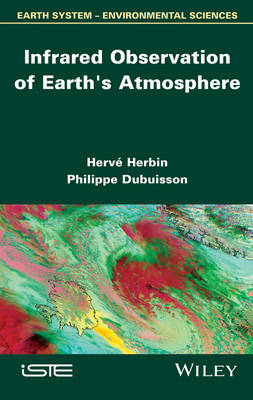
Infrared Observation of Earth's Atmosphere
ISTE Ltd and John Wiley & Sons Inc (Verlag)
978-1-84821-560-3 (ISBN)
Hervé Herbin is is associate Professor at the University of Lille 1, France. Philippe Dubuisson is a Professor in the physics department at the University of Lille 1, France.
Acknowledgements ix
List of Symbols xi
List of Acronyms xv
Preface xxi
Introduction xxv
Chapter 1. Basic Physics of the Atmosphere and Radiation 1
1.1. Structure and composition of Earth’s atmosphere 2
1.1.1. Vertical structure of the atmosphere 2
1.1.2. Atmospheric gases 3
1.1.3. Aerosols and hydrometeors 6
1.2. Atmospheric aerosols 7
1.2.1. Overview 7
1.2.2. Microphysical properties of aerosols 9
1.3. Clouds 13
1.3.1. Definitions and classification 13
1.3.2. Formation 15
1.3.3. Microphysical properties 17
1.4. Radiation in Earth’s atmosphere 20
1.4.1. Electromagnetic radiation 20
1.4.2. The foundations of radiometry 21
1.4.3. Solar and terrestrial radiation 23
1.4.4. Reflection and emission of radiation by a surface 29
1.5. Radiation budget of the climate system 32
1.5.1. Radiative balance of the atmosphere 32
1.5.2. The greenhouse effect and parasol effect 34
1.5.3. Radiative forcing of atmospheric components 36
1.5.4. Impact of aerosols on climate 38
1.5.5. Impact of clouds on climate 39
1.5.6. Climate sensitivity 40
1.5.7. Observation of radiative budget 41
1.6. For further information 42
Chapter 2. Instrumentation and Sensors 45
2.1. Platforms, satellites and sensors 46
2.1.1. Types of orbits 46
2.1.2. Characteristic parameters of satellites 49
2.1.3. Geometry of lines of sight 50
2.2. Infrared detection techniques 56
2.2.1. Radiometers 56
2.2.2. High spectral resolution instruments 58
2.3. For further information 66
Chapter 3. Forward Radiative Transfer in Absorbing Atmosphere 69
3.1. Gaseous absorption and emission 70
3.1.1. Overview 70
3.1.2. Rovibrational spectroscopy 72
3.1.3. Line shapes 85
3.1.4. Line intensity and absorption coefficient 89
3.2. Radiative transfer equation in an absorbing medium 90
3.3. Solving the RTE 94
3.3.1. Models at high spectral resolution: line-by-line codes 94
3.3.2. Approximate modeling of gas absorption 95
3.3.3. Boundary conditions and atmospheric parameters 101
3.4. For further information 102
Chapter 4. Forward Radiative Transfer in Scattering Atmosphere 105
4.1. Atmospheric scattering 106
4.1.1. Main properties of scattering 106
4.1.2. Rayleigh scattering 110
4.1.3. Mie scattering 111
4.1.4. Non-spherical particles 112
4.1.5. Extinction coefficient and optical thickness 113
4.2. Polarization 114
4.3. Radiative transfer equation (RTE) in a scattering medium 118
4.3.1. General expression of the RTE 118
4.3.2. Solving of the RTE 120
4.3.3. Azimuthal dependence of the radiation field 124
4.3.4. Simplification of the phase function 125
4.4. Numerical methods to solve the RTE in a scattering plane–parallel medium 127
4.4.1. Approximate analytical expressions 128
4.4.2. Discrete ordinate method 129
4.4.3. Adding-doubling method 130
4.4.4. Successive orders of scattering method 131
4.5. List of radiative transfer codes 131
4.6. For further information 133
Chapter 5. Methods of Geophysical Parameter Retrieval 135
5.1. Inversion process 136
5.1.1. Principle of the inversion process 136
5.1.2. The measurement vector and state vector 137
5.1.3. The forward model 137
5.2. Linear models 138
5.2.1. Linear least squares (LLS) method 139
5.2.2. Regularized linear model 140
5.3. Nonlinear inversion 142
5.4. Optimal estimation method (OEM) 144
5.4.1. Inversion method 146
5.4.2. Sensitivity of the measurement and informational content analysis 148
5.4.3. Error analysis for the retrieved profile 150
5.4.4. Example of water vapor profile retrieval from IASI 151
5.5. Lookup tables 156
5.6. For further information 163
Chapter 6. Space Infrared Remote Sensing: Some Applications 165
6.1. Water vapor isotopologues 166
6.2. Biomass fires and trace gases 170
6.3. Volcanic eruptions 174
6.3.1. Sulphur dioxide 175
6.3.2. Volcanic aerosols 177
6.4. Physical properties of clouds 181
6.4.1. Classification and physical properties of ice clouds 184
6.4.2. Thermodynamic phase and altitude of clouds 185
6.5. For further information 193
Appendix 195
Bibliography 201
Index 211
| Verlagsort | London |
|---|---|
| Sprache | englisch |
| Maße | 165 x 241 mm |
| Gewicht | 526 g |
| Themenwelt | Naturwissenschaften ► Geowissenschaften ► Meteorologie / Klimatologie |
| Technik ► Bauwesen | |
| Technik ► Umwelttechnik / Biotechnologie | |
| ISBN-10 | 1-84821-560-6 / 1848215606 |
| ISBN-13 | 978-1-84821-560-3 / 9781848215603 |
| Zustand | Neuware |
| Informationen gemäß Produktsicherheitsverordnung (GPSR) | |
| Haben Sie eine Frage zum Produkt? |
aus dem Bereich


